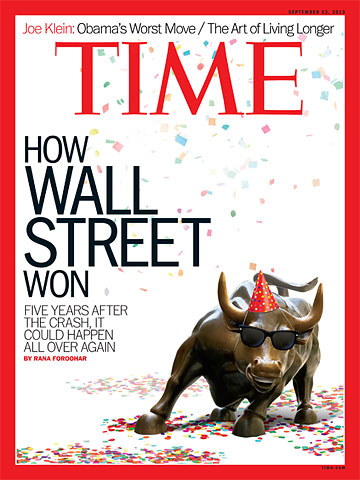
(3 of 6)
Since the crisis, some of the largest U.S. banks have raised the amount of capital they have to offset risk. Leverage ratios are down slightly from their precrisis peak. But many experts say we haven't come nearly far enough. When banks do business with higher ratios of debt, it can multiply the negative effect on the economy when trades go bad. "It's crazily irresponsible not to do more to limit leverage," says Princeton professor and former Federal Reserve vice chairman Alan Blinder, whose new book After the Music Stopped looks at the causes of the crisis and the risks that remain. FDIC vice chairman and bank-reform advocate Thomas Hoenig agrees and says the common Wall Street argument that limiting leverage will keep banks from lending more money to real businesses is bunk. If higher leverage boosts lending, he wrote in a recent Financial Times op-ed, "it does so at the taxpayer's expense ... by making large banks--and the real economy--more vulnerable to shocks." Indeed, there's evidence that banks with more capital are better able to maintain lending throughout cycles of boom and bust.
Leverage is "the elephant in the room," says Stanford's Admati, whose book The Bankers' New Clothes makes a powerful case for why banks should stop borrowing so much. Banks complain about proposed rules from the FDIC and the Federal Reserve that would require them to use a mere 5% of their own money on risky deals, when most of the rest of corporate America wouldn't dream of borrowing even 50% relative to assets, never mind 95%. "Banks have managed to convince us that they deserve special treatment," says Admati, often by invoking complicated arguments and using insider lingo. Indeed, it's worth remembering that what bankers refer to as cash is very often debt: the deposits they hold for other people. Admati would like to see regulators require that banks use more like 20% or 30% of their own money to do their daily business. "If banks want to trade," she says, "they should be forced to gamble with their own money."
No. 3
Expose Weapons Of Mass Financial Destruction
Warren Buffett once dubbed derivatives--the complex spliced-and-diced securities that blew up the financial system back in 2008--weapons of mass financial destruction because of the way they allowed small risks to multiply and spread around the global financial system. Remember those credit-default swaps that allowed subprime-mortgage risk to ricochet from Arizona to Iceland and back?
